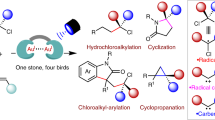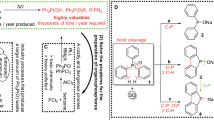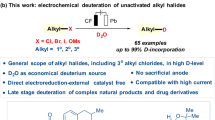Abstract
IT has recently been shown1 that electron-donating solvents such as diethyl phthalate (DEP) provide a convenient route to the synthesis of alkylphosphonic dichlorides from the complex formed by combination of an alkyl halide, phosphorus trichloride, and aluminium chloride2. It has since been found that alkylphosphonous dichlorides may be synthesized from similar solutions of the complex by reduction with finely powdered antimony. The reaction scheme is : 
This is a preview of subscription content, access via your institution
Access options
Subscribe to this journal
Receive 51 print issues and online access
$199.00 per year
only $3.90 per issue
Buy this article
- Purchase on Springer Link
- Instant access to full article PDF
Prices may be subject to local taxes which are calculated during checkout
Similar content being viewed by others
References
Reesor, J. B., Perry, B. J., and Sherlock, E., Canad. J. Chem. (Sept. 1960).
Kinnear, A. M., and Perren, E. A., J. Chem. Soc., 3437 (1952).
Author information
Authors and Affiliations
Rights and permissions
About this article
Cite this article
FERRON, J., PERRY, B. & REESOR, J. A New Synthetic Route to Alkylphosphonous Dichlorides. Nature 188, 227–228 (1960). https://doi.org/10.1038/188227b0
Issue Date:
DOI: https://doi.org/10.1038/188227b0
This article is cited by
-
A New Synthetic Route to Dialkylphosphinous Chlorides
Nature (1961)
Comments
By submitting a comment you agree to abide by our Terms and Community Guidelines. If you find something abusive or that does not comply with our terms or guidelines please flag it as inappropriate.



